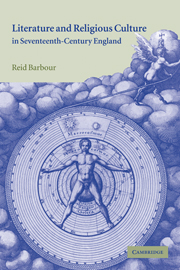Book contents
- Frontmatter
- Contents
- Acknowledgements
- Introduction: spirit and circumstance in Caroline Protestantism
- Chapter 1 The church heroic: Charles, Laud, and Little Gidding
- Chapter 2 Great Tew and the skeptical hero
- Chapter 3 Between liturgy and dreams: the church fanciful
- Chapter 4 Respecting persons
- Chapter 5 Decorum and redemption in the theater of the person
- Chapter 6 Nature (I): post-Baconian mysteries
- Chapter 7 Nature (II): church and cosmos
- Conclusion: Rome, Massachusetts, and the Caroline Protestant imagination
- Notes
- Index
Chapter 2 - Great Tew and the skeptical hero
Published online by Cambridge University Press: 22 September 2009
- Frontmatter
- Contents
- Acknowledgements
- Introduction: spirit and circumstance in Caroline Protestantism
- Chapter 1 The church heroic: Charles, Laud, and Little Gidding
- Chapter 2 Great Tew and the skeptical hero
- Chapter 3 Between liturgy and dreams: the church fanciful
- Chapter 4 Respecting persons
- Chapter 5 Decorum and redemption in the theater of the person
- Chapter 6 Nature (I): post-Baconian mysteries
- Chapter 7 Nature (II): church and cosmos
- Conclusion: Rome, Massachusetts, and the Caroline Protestant imagination
- Notes
- Index
Summary
Like Nicholas Ferrar, Lucius Cary presided over an extraordinary community in which the circumstance of religious heroism was eulogized, scrutinized, and recast. More than Ferrar, however, Cary embodied for his contemporaries both the legacy and the enigmas of that heroism. One sees this tendency in literature produced about Cary even in the years before he established his academy at Great Tew. In a Pindaric ode celebrating the friendship shared by Cary and Sir Henry Morison, Ben Jonson commences with a bold image of just how elusive an other- worldly heroism can be for even the wisest interpreter. Then over the course of the ode, he refashions that image so that Morison and Cary come to mythologize a well-rounded heroic friendship – at once contemplative and dutiful, rational and fervent – as a pious and honest alternative to the courtly composite staged by those masques from which Jonson was finding himself excluded.
Jonson's image of elusive heroism is the Infant of Saguntum, whose response to his birth into the chaotic, ignoble, and savage inception of the second Punic War is return into his mother's womb. The Infant's return, or antistrophe, is imputed perfect by the poet whose emblem for the return is so “summed a circle.”
- Type
- Chapter
- Information
- Publisher: Cambridge University PressPrint publication year: 2001



